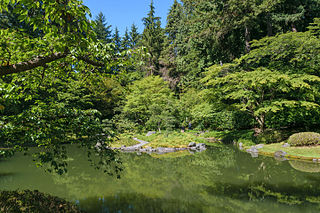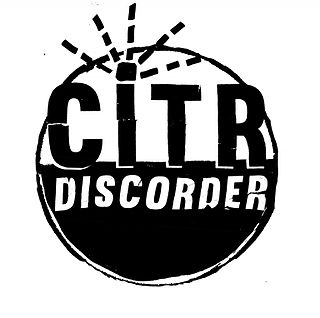
The University of British Columbia (UBC) is a public research university with campuses near Vancouver and in Kelowna. Established in 1908, it is the oldest university in British Columbia. With an annual research budget of $759 million, UBC funds over 8,000 projects a year.

The Nitobe Memorial Garden is a 2+1⁄2-acre traditional Japanese garden located at the University of British Columbia, just outside the city limits of Vancouver, British Columbia, Canada. Although it is part of the UBC Botanical Garden, Nitobe Memorial Garden is located next to UBC's Asian Centre, two kilometers from the main UBC Botanical Garden.

UBC Botanical Garden, at the University of British Columbia, was established in 1916 under the directorship of John Davidson, British Columbia's first provincial botanist. It is the oldest botanical garden at a university in Canada.
Steveston, founded in the 1880s, is a neighbourhood of Richmond in Metro Vancouver. On the southwest tip of Lulu Island, the village is a historic port and salmon canning centre at the mouth of the South Arm of the Fraser River. The early 1900s style architecture attracts both the film and tourism industries.

The Peter A. Allard School of Law is the law school of the University of British Columbia. The faculty offers the Juris Doctor (J.D.) degree. The faculty features courses on business law, tax law, environmental and natural resource law, indigenous law, Pacific Rim issues, and feminist legal theory.
Vancouver Public Library (VPL) is the public library system for the city of Vancouver, British Columbia. In 2013, VPL had more than 6.9 million visits with patrons borrowing nearly 9.5 million items including: books, ebooks, CDs, DVDs, video games, newspapers and magazines. Across 22 locations and online, VPL serves nearly 428,000 active members and is the third-largest public library system in Canada.

CiTR-FM is a Canadian FM radio station based in the University of British Columbia's Student Union Building in the University Endowment Lands, just west of the city limits of Vancouver, British Columbia. Its transmitter is also located on campus.

The Musqueam Indian Band is a First Nations band government in the Canadian province of British Columbia. It is the only First Nations band whose reserve community lies within the boundaries of the City of Vancouver.
The Institute of Asian Research (IAR) at the University of British Columbia is a research institute founded in 1978 and has been the foremost research centre in Canada for the inter-disciplinary study of Asia. With a broad geographic reach extending to China, India and South Asia, Japan, Korea and Southeast Asia, the institute conducts research and teaching on policy-relevant issues informed by language and area studies.
The University of British Columbia Library is the library system of the University of British Columbia (UBC). The library is one of the 124 members of the Association of Research Libraries (ARL). In 2017, UBC Library ranked 29th among members of the ARL for the number of volumes in library, making it the third largest Canadian academic library after the University of Toronto and the University of Alberta. However, UBC Library ranked 23rd for the titles held and second in Canada, and had a materials expenditures of $13.8 million, placing it 44th.

The Khalsa Diwan Society Vancouver is a Sikh gurdwara organization in Vancouver, British Columbia, Canada.
The UBC's Okanagan Campus is one of the University of British Columbia's campus located in Kelowna, British Columbia, Canada.
The UBC Computer Science department at the University of British Columbia was established in May 1968. UBC CS is located at the UBC Point Grey campus in Vancouver, British Columbia, Canada. As of September 2022, it has 65 faculty, 62 staff, 248 graduate students, and 2,763 undergraduates.

The University Endowment Lands (UEL) is an unincorporated area that lies to the west of the city of Vancouver, British Columbia, Canada, and adjacent to the University of British Columbia (UBC) and the lands associated with that campus. Pacific Spirit Regional Park lies within the UEL. The UEL is part of Metro Vancouver. Mail sent to the UEL is addressed to "Vancouver" rather than the UEL.
The UBC Institute for the Oceans and Fisheries (IOF) is a research unit at the University of British Columbia (UBC) that was formed in 2015 by incorporating members from the former UBC Fisheries Centre, as well as a subset of researchers that are conducting marine related research at UBC. The IOF developed its own graduate program, which welcomed its first cohort of graduate students in September 2019. In addition to students of its OCF program, members are also drawn from other graduate programs at UBC, primarily from the Institute for Resources, Environment and Sustainability, the Departments of Earth, Ocean and Atmospheric Sciences, Zoology, Geography, and Botany, and the School of Public Policy and Global Affairs. The UBC Institute for the Oceans and Fisheries brings together a community of Canadian and international experts in ocean and freshwater species, systems, economics, and issues to provide new insights into how global marine systems function, and the impacts of human activity on those systems. It is working towards a world in which the oceans are healthy and their resources are used sustainably and equitably. IOF is located at The University of British Columbia, and promotes multidisciplinary study of aquatic ecosystems and broad-based collaboration with researchers, educators, maritime communities, government, NGOs, and other partners.

The history of Japanese people in British Columbia began with the arrival of Manzo Nagano in New Westminster in 1877. Prior to 1942, British Columbia was home to 90% of all Japanese in Canada. In 2001, 44% of all Japanese Canadians lived in British Columbia, or about 1% of the province's total population.












